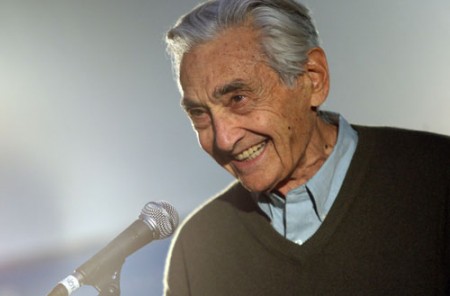http://www.inthesetimes.com/working/entry/5483/farewell_howard_zinn/Thursday January 28 12:24 pm

Howard Zinn speaks during the People Speak ASCAP Music Cafe performance held during the 2009 Sundance Music Festival, in Park City, Utah. (Photo by Bryan Bedder/Getty Images)
By Jeremy Gantz
Yesterday, America lost one of its foremost voices for peace, workers' rights and social justice: Howard Zinn, the historian, playwright andabove all elseactivist who inverted the traditional telling of history to place common people at the center, rather than rulers. By this simple, radical act, he undermined the status quo and helped us view the world through a more humane lens.
Zinn, who was 87, died of a heart attack in California. The Boston Globe has a good obit here (he was a longtime professor at Boston University), and excerpts from his graphic novel, A People History of American Empire, which he published at the young age of 85. Henry Giroux, Zinn's colleague and comrade at BU, offers a powerfully personal remembrance here.
Lots of ink will be spilled in the coming days exploring Zinn's life (a long and fruitful one, by any reckoning). We here at Working In These Times thought we'd offer a few personal recollections, along with some videos of Zinn himself.
As a native son of Plymouth, Massachusetts, I was impacted by Zinn's People's History of the United States in a very specific way: It directly challenged the established narrative of Pilgrim history, which was (and essentially continues to be) so dominant in that town and beyond as to be almost doctrine. Pilgrims were the heroes, at the center of Plymouth's (and, indeed, America's) history, while native Americans were marginal at best, and obstacles to "progress" at worst.
Zinn exploded that imperialist viewpoint, and by doing so made me realize that history is not just written, but debated. Nothing is ever really settled, as much as those in power wish it were so.
The first and only time I saw Zinn in person was in October 2003 in rural Minnesota, where I was finishing up college, majoring in American history in no small part due to Zinn. I saw him speak in a chapel, about topics you'd expect: war, peace, Iraq, the Bush administration, imperialism. Nothing that he said particularly surprised mewhich doesn't mean his words weren't powerful.
FULL story at link.
